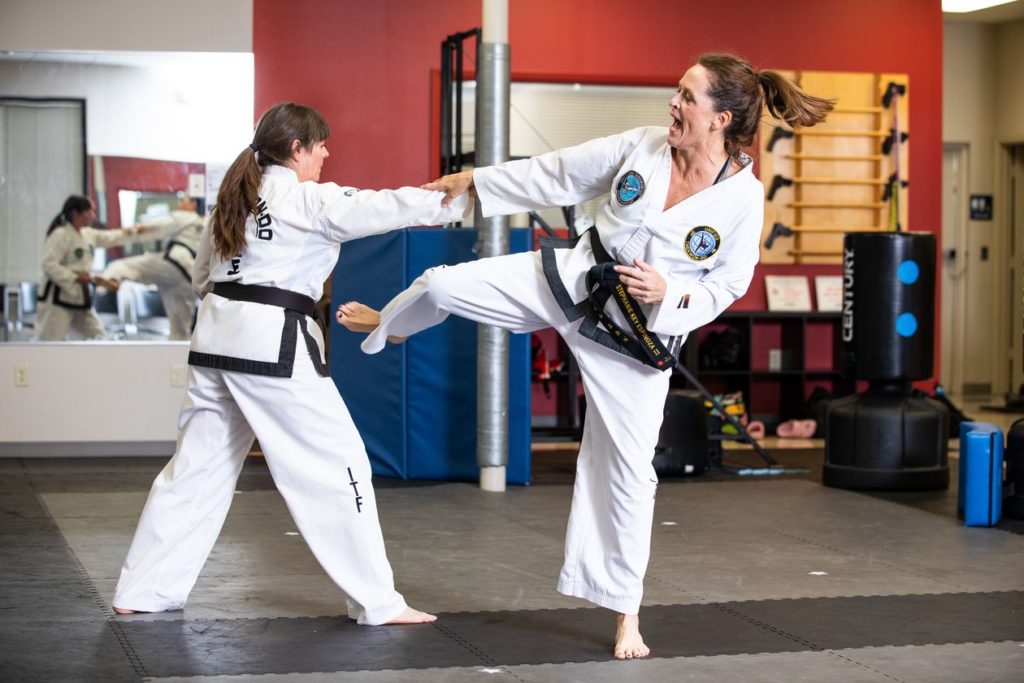
An Arizona couple and their children take taekwondo lessons, learning mental discipline and self-defense
By Jen Murphy | The Wall Street Journal
(Edited for length)
Parents typically don’t bond with their teenagers by fighting. But Stephanie Espinoza says taekwondo lessons have brought her and her 19-year-old daughter, Anna, closer together.
“We even have matching pink sparring gear,” says Ms. Espinoza, a Phoenix architect.
Her husband, Brian Espinoza, was dead set on having their two children learn self-defense. After researching various martial arts, they settled on taekwondo for its combination of mental discipline and self-defense skills.
In 2012, she enrolled their son, Julian, then 8, in lessons at Karstadt Taekwon-Do in Phoenix. Within two months, the entire family was going to the studio. “I have so little time to work out,” Ms. Espinoza says. “I figured why sit and watch when I could join in?”
A Korean martial art, taekwondo loosely translates to the art of kicking and punching. The sport, one of the faster martial arts, emphasizes kicking techniques, while karate focuses on hand strikes.
“I was surprised by the cardiovascular benefits,” Ms. Espinoza says. In addition to learning moves like spin kicks, students get lessons in integrity, perseverance and leadership.
At one point, the entire family took the same class. “Everyone joked about the husband and wife beating each other up,” she says. “And my daughter would ask if she’d be in trouble when we got home if she hit me.”
Ms. Espinoza, 51, hoped they would all get their black belts together, but her son, now 15, became distracted by soccer and her husband got busy with work. In 2015, mother and daughter earned their black belts—a traditional symbol of mastering self-defense skills—together. “I don’t know who was more proud,” she says.
Ms. Espinoza earned her second-degree black belt in 2017. Her son teases her about her newfound toughness; she says it is undeniable that taekwondo has made her more confident.

“I’ve always been on the shy side and used to cast my eyes down and speak quietly,” she says. “Now I feel I can look anyone in the eye and use a commanding voice.”
Ms. Espinoza practices taekwondo two to three days a week. Monday nights she attends a two-hour black belt class. Tuesday or Wednesday night she goes to an all-levels class, often with her husband, who recently tested for his first-degree black belt.
On Saturdays she takes a class to review patterns, or sequences of movement. The International Taekwon-Do Federation teaches 24 patterns. Each has anywhere from 19 to 72 movements.
Some parents worry that martial arts might make their children more aggressive, says David Karstadt, owner of Karstadt Taekwon-Do in Phoenix. But according to researchers at University of California, Los Angeles and Bar-Ilan University in Israel, martial arts could help reduce aggressive behaviors outside the taekwondo studio.
“There are definitely aggressive components of martial arts,” says Yuri Rassovsky, a professor in the department of psychology at Bar-Ilan University. “But the philosophical foundation of traditional martial arts balances that out, teaching a deep interpersonal respect.”
A recent study published in Scientific Reports in which Dr. Rassovsky served as the lead researcher showed that martial arts increased the production of oxytocin, a hormone linked to behaviors including trust, cooperation and social and romantic bonding, in both beginner and advanced practitioners.
Mr. Karstadt noted that the type of fighting he teaches looks quite different from what people see in movies or videogames. “Some studios are more sport-oriented,” he says. “More traditional martial arts studios incorporate a lot of self-discipline. We focus on five tenets—courtesy, integrity, perseverance, indomitable spirit and self-control.”
Mr. Karstadt says many martial arts forms at their essence are about learning how to manage and channel stress. “For kids and adults, class can be an hour where you don’t have to worry about life,” he says. “You also learn to think before you act.”












